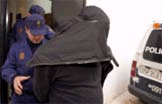crackdown on Costa Blanca crime, the police have arrested 28 alleged members of criminal groups from former Soviet countries
Monday, 18 August 2008

crackdown on Costa Blanca crime, the police have arrested 28 alleged members of criminal groups from former Soviet countries on suspicion of money laundering in what Spanish authorities have called the largest-ever crackdown on international organized crime in Europe.The arrests took place in Benissa, Alicante, Aigues, Orihuela, Altea and Benidorm as well as Malaga and Barcelona. More than 400 Spanish police agents took part in operation Avispa, or "Wasp," a weekend-long sting that culminated in the detention of 28 people whom they allege are members of the "Russian mafia," Police conducted raids in 11 cities along Spain's Mediterranean coast, seizing cars, cash, jewelry, weapons and works of art, the Spanish Interior Ministry announced Monday. In all, police seized 41 homes and businesses and froze 800 bank accounts.Most of those arrested were ethnic Georgians, the ministry said.
Munoz said that 13 of the 22 held Georgian passports, five Russian passports, three Spanish passports and one a German passport. No names were immediately released.They were placed under arrest on suspicion of belonging to illegal organizations, money laundering and fraudulent bankruptcy.The operation was a joint international effort involving police forces from Russia, Germany, France, Belgium, Israel and the United States, the Interior Ministry said in a statement posted on its web site.The raids yielded 42 luxury vehicles, including Bentley, Mercedes, Porsche, Jaguar and BMW models. Weapons seized included shotguns and ammunition, brass knuckles, knives and a saber.The money-laundering operations were conducted primarily in the Cataluna, Costa del Sol and Alicante regions of Spain and involved the purchase of property and establishment of fraudulent commercial and financial networks, the Interior Ministry said.As money-laundering fronts, the groups set up restaurants, bars and clubs, which were among the properties seized, the ministry said. Also seized were country villas, city offices and a site to be turned into a housing development, "Los Eucaliptus," consisting of 38 identical homes. Footage of the raids shown on NTV television Monday evening showed one of the suspects handcuffed and in his underwear on the floor of an lavishly decorated living room.
The Spanish Interior Ministry's statement called the operation the "biggest blow to international organized crime in all of Europe to date."Spanish authorities said that 22 of the suspects were notorious crime bosses known as "thieves-in-law."
While the Spanish Interior Ministry talked in terms of the "Russian mafia," this blanket term is commonly used in the West for often-unrelated criminal groups from the territory of the former Soviet Union.
Denis Dechkov, a diplomat at the Russian Embassy in Madrid, said Spanish authorities had not provided the embassy with any information about the arrests. "I have no information about how many of them are Russian citizens," he said.
Gregorio Laso-Mostoles, spokesman for the Spanish Embassy in Moscow, also said he did not know how many Russian citizens had been arrested. "At this time, I can say only that the majority of those arrested are of Georgian nationality," he said.
It was unclear whether any of them were facing criminal charges in Russia. Prosecutor General's Office spokeswoman Tatyana Matyunina said she had no information about the arrests and could not comment on possible extradition requests.
Reached by telephone, a spokeswoman for the Spanish Justice Ministry, Julia Gomez, said she expected the suspects to be tried in Spanish courts for the crimes committed on Spanish soil.Andrei Konstantinov, who heads the Agency of Journalistic Investigations in St. Petersburg and has a reputation as the most knowledgeable chronicler of Russia's criminal underworld, said that Russian gangsters began moving to Spain in the mid-1990s to escape the turf wars."Most of them left behind the life of crime and began buying real estate to legitimize the dirty money," Konstantinov said Monday. "But it wasn't just the gangsters. A lot of bureaucrats who earned their money dishonestly also went to Spain."The Spanish police operation was conducted under the auspices of a special anti-corruption commission overseen by the Spanish high court, Audencia Nacional, and appeared to be part of a broad campaign against money laundering and organized crime. Calls to Audencia Nacional went unanswered Monday.
In March, seven people were jailed in southeast Spain on provisional charges related to money laundering, possibly linked to the Yukos oil major.
Reuters quoted a source close to the investigation as saying the suspects may have been siphoning funds from Yukos without the company's knowledge as part of a bigger money-laundering ring.
"These are individuals who, from inside the Russian company, appear to have diverted sums of money ... which then left the country without the knowledge of the company or the tax authorities," Reuters quoted the source as saying.
A week earlier, 33 others had been arrested on Spain's Mediterranean coast on money-laundering charges.Spanish Attorney General Candido Conde-Pumpido at the time called those money-laundering arrests "the tip of the iceberg" of international organized crime in Spain.







0 comments:
Post a Comment